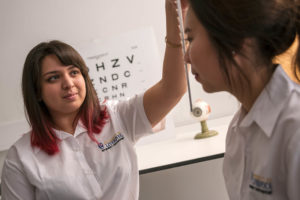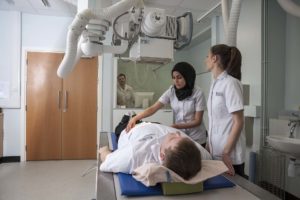How you'll learn
Learning and teaching will be delivered using a hybrid model. Students will have blocks of on campus and online teaching.
The online blocks can range from 1-5 weeks where teaching and learning will be delivered online using asynchronous and synchronous activities. The ‘on campus’ blocks range from 2-7 weeks where students will engage with face-face teaching to consolidate their online learning and have the opportunity to integrate theory and practice. The simulation weeks will also be delivered on campus.
The learning and teaching strategy aligns with S2026 and meets the Liverpool Curriculum hallmarks and attributes. The students will experience the Liverpool hallmarks: ‘Research-connected teaching’, ‘Active learning’ and ‘Authentic assessment’.
Through these learning opportunities the students will develop graduate attributes: confidence, digital fluency and global citizenship. Students will be required to interact with a number of digital platforms, for example, the University VLE, Microsoft Teams, recorded clinical skills, innovative Virtual Reality technology, Endnote and formative assessments tools like Kahoot to enhance their digital fluency and active learning.
The programme is culturally rich using inclusive teaching methods, having the opportunity to learn with and from individuals from diverse backgrounds and to interact with groups of people from all backgrounds. These hallmarks will enable students to develop into confident independent orthoptists who are autonomous, self-aware and capable of undertaking evidence based practice.
In year one of the programme, students will have the opportunity to attend a clinical placement site anywhere in the UK for 10 weeks (2x blocks of 4 weeks and 1 block of 2 weeks).
In year two, students will attend clinical placement for 11 weeks (1 block of 3 weeks and 2x blocks of 4 weeks) gaining valuable clinical experience to consolidate their knowledge.
How you're assessed
The assessment strategy for this programme aligns with the ‘Authentic assessment’ hallmark of the Liverpool Curriculum Framework where students will undertake assessment tasks across the two years that is reflective of the skills and knowledge required to practice as an orthoptist.
These include a range of different assessment methods requiring the student to demonstrate active learning and assesses their ability to demonstrate an integrated application of academic knowledge and practical skills relevant to orthoptics. Assessments include Online quizzes, written and practical examination and portfolios. These are scheduled appropriately throughout the 2-year programme. The research modules involve the student writing a project proposal at the end of year one and a journal article at the end of year two.
Liverpool Hallmarks
We have a distinctive approach to education, the Liverpool Curriculum Framework, which focuses on research-connected teaching, active learning, and authentic assessment to ensure our students graduate as digitally fluent and confident global citizens.
The Liverpool Curriculum framework sets out our distinctive approach to education. Our teaching staff support our students to develop academic knowledge, skills, and understanding alongside our graduate attributes:
- Digital fluency
- Confidence
- Global citizenship
Our curriculum is characterised by the three Liverpool Hallmarks:
- Research-connected teaching
- Active learning
- Authentic assessment
All this is underpinned by our core value of inclusivity and commitment to providing a curriculum that is accessible to all students.









